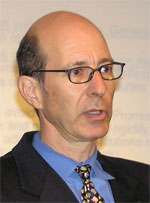The neocon factor dramatically changes the interpretation of the Trump administration’s unilateralist international economic policy chatter. Donald Trump’s first one hundred days have revealed his inclination for unilateralism in international relations. That inclination reflects his opportunistic and bullying disposition, and it also fits well with his anti-globalization pose. Trump’s unilateralism has also spawned a dangerous waltz with [...]
Read More »The Real Reasons for Trump’s Anti-Globalization Circus
Trumponomics: How Trump skillfully used anti-globalization as bait to cover up his extremely neoliberal switch. A key element of Trump’s political success has been his masquerade of being pro-worker, which includes posturing as being anti-globalization. However, his true economic interests are the exact opposite. That creates conflict between Trump’s political and economic interests. For political leaders [...]
Read More »Monetary Policy and the Punch Bowl: The Case for Quantitative Policy and Wage Growth Targeting
Federal Reserve Chairman William McChesney Martin famously declared that the Federal Reserve “is in the position of the chaperone who has ordered the punch bowl removed just when the party was really warming up.” This paper uses the punch bowl metaphor to analyze how the Federal Reserve can improve monetary policy so as to deliver [...]
Read More »Trumponomics:NeoconNeoliberalism Camouflaged with Anti-Globalization Circus
A key element of Trump’s political success has been his masquerade of being pro-worker, which includes posturing as anti-globalization. However, his true economic interest is the exact opposite. That creates conflict between Trump’s political and economic interests. Understanding the calculus of that conflict is critical for understanding and predicting Trump’s economic policy, especially his international [...]
Read More »Fixing the Euro’s Original Sins: The Monetary – Fiscal Architecture and Monetary Policy Conduct
The euro zone (EZ) was created in January 1999. Its weak economic performance is significantly due to the euro’s neoliberal monetary architecture and the design of monetary policy. Those features undermine national political sovereignty and consign the EZ to severe economic under-performance, which in turn fosters political demands for exit from the euro. Escaping this [...]
Read More »Are Negative Interest Rates Dangerous?
A debate on negative interest rates. YES, Thomas Palley: “One can have too much of a good thing”. NO, Adam Posen: “Negative interest rates have proved useful”. READ IT HERE
Read More »The Federal Reserve Raising Interest Rates is Unwelcome and Unnecessary
Wednesday’s decision by the Federal Reserve to raise interest rates is unwelcome and unnecessary. As admitted in its statement, investment remains soft, growth is only moderate, and inflation expectations are little changed. Moreover, the economy confronts financial headwinds from the recent jump in long term interest rates and an even stronger dollar. The Federal Reserve seems [...]
Read More »To President Obama and Secretary Clinton: In the name of god, go
Dear Secretary Clinton and President Obama: On April 20, 1653, Oliver Cromwell spoke these words to the Long Parliament: “You have sat here too long for any good you have been doing… Depart, I say, and let us have done with you. In the name of god, go.” Secretary Clinton, you are rightly being blamed for the electoral [...]
Read More »James Tobin
James Tobin was a leading - perhaps the leading - American neo-Keynesian macroeconomist in the era of Keynesian dominance after World War II that extended through to the early 1970s. Along with growth theorist Robert Solow and micro and trade theorist Paul Samuelson, the three substantially shaped what became known as the neoclassical synthesis which [...]
Read More »A Theory of Economic Policy Lock-in and Lock-out via Hysterisis: Rethinking Economists’ Approach to Economic Policy
This paper explores lock-in and lock-out via economic policy. It argues policy decisions may near-irrevocably change the economy’s structure, thereby changing its performance. That causes changed economic outcomes concerning distribution of wealth, income and power, which in turn induces locked-in changes in political outcomes. That is a different way of thinking about policy compared to [...]
Read More » Thomas Palley: Economics for Democratic and Open Societies
Thomas Palley: Economics for Democratic and Open Societies
